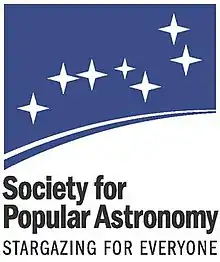 | |
| Abbreviation | SPA |
|---|---|
| Formation | 1953 |
Region served | United Kingdom |
President | Prof Lucie Green |
| Website | www |
| Remarks | Vice Presidents: Robin Scagell |
The Society for Popular Astronomy (SPA) is a national astronomical society based in the United Kingdom for beginners to amateur astronomy.[1]
History and overview
It was founded in 1953 as the Junior Astronomical Society[2] by experienced amateur astronomers including Patrick Moore, Ernest Noon and Eric Turner to encourage beginners to the science and to promote astronomy among the general public.
The term "Junior" was used to denote its role compared to the long-established society the British Astronomical Association. The name was changed in 1994 to make clear that the society was for beginners of all ages, and for those who wanted a less technical approach. In 2007 a new Young Stargazer category of membership was introduced to cater specifically for members aged under 16.
The society's first patron was Dr J G Porter whose BBC radio broadcasts about astronomy preceded television's long-running series The Sky At Night. Since his death, the role has been held by certain Astronomers Royal. The society's president, who serves a two-year term, is usually a senior professional astronomer.
The SPA aims to show that astronomy can be fun and to promote an interest in observing the sky among its members. The SPA has a number of observing sections whose work members can participate in. These cover observations of aurorae, comets, deep sky, the Moon, meteors, occultations, the planets, the Sun and variable stars.
The society publishes a magazine, Popular Astronomy, which from 2011 is being published every two months. Previously it was a quarterly publication, but it now includes material that was carried in now-defunct separate regular printed News Circulars. A members-only email newsletter provides immediate news of major discoveries as well as information and reminders about society meetings and events.
The SPA offers advisory services on choosing a telescope, electronic imaging, photography and the GCSE astronomy examination.
Meetings are held quarterly in London and there is an annual weekend course in Shropshire. Occasional meetings are held elsewhere including at planetariums.
NOTE DATED 2020 MAY: Meetings are being held on-line for the foreseeable future; the annual weekend course scheduled for 2020 November has been deferred twice to 2022.
NOTE DATED 2023 JANUARY: Physical meetings in London have resumed, with on-line streaming available for the benefit of those unable to travel to the venue. The annual weekend courses have also resumed.
Observing sections
| Section | Description | Director |
| Aurora | Observing the annual occurrence of the aurora and noctilucent cloud | Sandra Brantingham |
| Comet | Information and observations of cometary objects | Stuart Atkinson |
| Deep Sky | Everything beyond the Solar System including double stars, galaxies, starclusters and nebulae | David Finnigan |
| Lunar | All things related to observing the natural satellite | David Graham |
| Meteor | Meteors and how to observe them | Mark McIntyre |
| Occultation | Observing and recording occultation events | Mell Jeffery |
| Planetary | Observing the planets of the Solar System | Alan Clitherow |
| Solar | Information and advice on SAFELY viewing and learning more about the nearest star | John Chapman-Smith |
| Variable Star | The SPA Variable Star Section observes a mixture of naked eye, binocular and telescopic variables | Matthew Barrett |
See also
Notes
- ↑ SPA website (About page)
- ↑ "50 Years of the Society for Popular Astronomy" (PDF). Federation of Astronomical Societies Newsletter (72). Spring 2003. ISSN 1361-4126. Retrieved 23 November 2015.
References
"Popular Astronomy", Popular Astronomy, Society for Popular Astronomy, ISSN 0261-0892